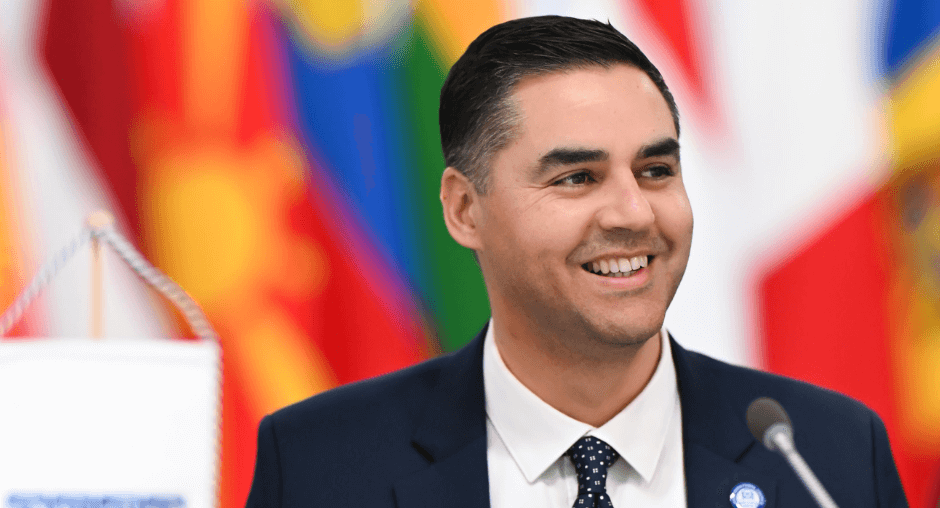The Organisation for Security and Cooperation in Europe (OSCE) has survived another year. Admittedly, with some help to maintain vital functions, but with the majority of its members still optimistic that the pan-European security forum will survive.
"In times of war and multiple crises, the OSCE is needed more than ever as one of the last open channels of communication in Europe," said the organisation’s chairman, Malta’s chief of diplomacy, Ian Borg, at the opening of the annual conference, which ends today in Malta.
However, Malta, like several previous chairs, appears relieved to hand over the leadership of the organisation to the next OSCE member, along with a handful of worries about its survival.
Finland will take over on 1 January, a significant milestone as it will commemorate the 50th anniversary of the adoption of the Helsinki Final Act, the founding document of European security and cooperation that laid the groundwork for the OSCE.
Will the symbolism of half a century of European, US, and Canadian concern for the continent's security and respect for each other's borders, peace, and cooperation be enough to breathe new energy into the weakened organisation in decline?
A historical echo of the Cold War
If Helsinki and Finland were the right choices 50 years ago to organise the historic agreement between the West and East at the height of the Cold War, it is only a symbolic historical echo today.
Finland, as the future chairman of the OSCE, is the best example of the profound changes that Europe has undergone not only in the last 50 years, but also in the last three years. Previously neutral, Finland is now a member of NATO, which the other party at the OSCE table, Russia, regards as an existential threat and enemy.
The OSCE enters its anniversary year with the burden that the all 10 principles from the Helsinki Final Act have been severely violated—such as the inviolability of frontiers, for example, in the case of Georgia in 2008, Ukraine in 2014 and 2022, or the peaceful settlement of disputes and non-intervention in internal affairs.
The OSCE's ability to effectively manage the numerous security crises on the European continent has long been questionable, almost completely absent.
OSCE shares the fate of other traditional international forums, including the UN
In this respect, OSCE shares the fate of other traditional international forums, including the UN, whose actions are blocked as the result of the sharp polarisation between Western structures on the one hand and Russia and its allies on the other.
Given that decision-making in the OSCE is based on the consensus of its 57 members, any decision that would effectively contribute to reducing security tensions on the continent has been impossible for years.
The organisation has been unable to adopt a unified annual budget since 2021 due to the inertia of annual national contributions, which total around 140 million euros. This funding is insufficient to do more than maintain vital functions.
Peace in Ukraine without the OSCE
The ministerial meeting in Valletta this year also offered no indication of a decrease in internal tensions. As expected, outgoing US Secretary of State Antony Blinken devoted most of his speech to criticising Russia's severe violations of the Helsinki Principles, its aggression against Ukraine, and its unacceptable interference in the internal affairs of many European member states, particularly in their electoral processes.
The chief of Russian diplomacy, Sergei Lavrov, left the room before Blinken's speech, making it clear that Russia does not accept dialogue within the framework of the organisation, which was founded in the middle of the Cold War precisely because of this dialogue.
None of the peace initiatives for Ukraine to date mention the OSCE
It is challenging to envision the OSCE serving as the mechanism for resolving the current crises in Europe. None of the peace initiatives for Ukraine to date, including the latest indications of potential talks from Kyiv, Washington, and other capitals, mention the OSCE.
"When the war in Ukraine ends, the OSCE would be the logical place to rebuild the European security architecture because of its inclusive membership and comprehensive approach," said Walter Kemp of the Global Initiative against Transnational Organised Crime, a former OSCE official.
However, expectations for a future role for the OSCE in the European security architecture must first await the outcome of the Russian-Ukrainian conflict, where mediators are likely to have slightly different ambitions in the post-war period.
These ambitions are unlikely to involve the OSCE, given its previous dysfunctionality.
The decisive test in 2025
The OSCE's role as a promoter and protector of democratic procedures and the rule of law does not raise any expectations for its future either.
In the regions where the organisation still maintains robust field missions—the Caucasus, the Balkans, and south-eastern Europe—a series of national elections have shown the growing disruptive influence of Russia on electoral processes.
 The OSCE missions do not have a mechanism to effectively suppress violations of democratic processes - Ian Borg, OSCE Chair-in-Office
The OSCE missions do not have a mechanism to effectively suppress violations of democratic processes - Ian Borg, OSCE Chair-in-Office
Apart from registering such violations of democratic processes, the OSCE missions do not have a mechanism to effectively suppress them. Other actors, like the EU or NATO, perform this task with varying degrees of success.
Therefore, the OSCE's future is far from bright, as the new polarisation in Europe has completely erased the inclusivity that produced results during the Cold War and immediately after.
The jubilee year 2025 will therefore be the decisive test, in which the OSCE members will have to answer the question of whether they are prepared to adapt the organisation to new challenges or let it sink into history.